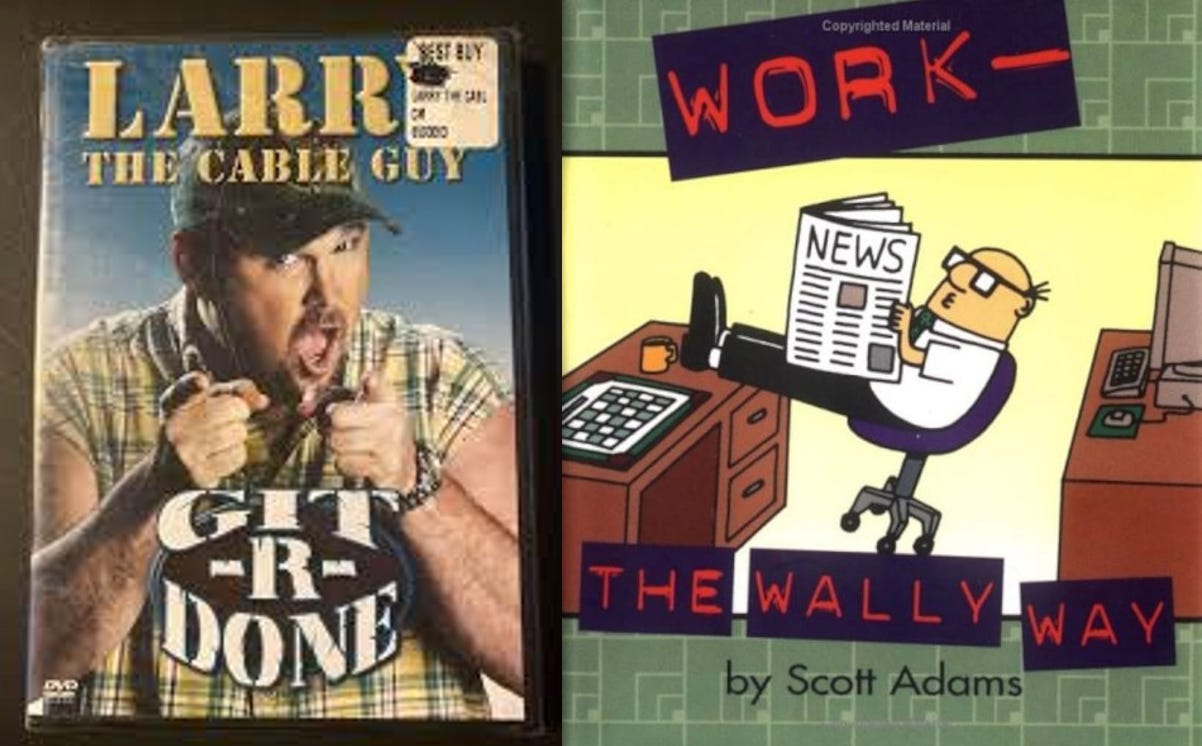Are You a Git R Dun or a Wally?
On Work, Pride, and the Quiet Crisis of Doing Just Enough
“Git er done.” It’s a redneck saying that’s been around for a long time, at least since the 50s, and it just means whatever you have to do, go do it.
Larry the Cable Guy popularized it. He said, “whatever you gotta do, don’t bitch about it, don’t complain about it, give 110 percent, just git er done.” And do it on time. Take pride in your work—“not because your customer or your boss or your peers will judge you if you don’t, but because that’s the standard you hold yourself to.”
The alternative is Dilbert’s Wally. He does almost no work and revels in the fact that he gets paid and gets away with it (“My philosophy is that anything worth doing is too hard”).
He appears to work while doing nothing. Wally is asked about his purpose in life and he replies, “My purpose is to transport huge quantities of coffee from the coffee maker to a urinal.”
Below is some anecdotal information about both:
Wally’s People
Trades—People often share stories of workers in the trades—carpenters, electricians, plumbers, roofers—doing lousy work. Meanwhile, younger office workers often prioritize work/life balance and personal fulfillment, which can sometimes give the appearance of being a “Wally.”
Restaurants—We see Wallys in fast food too, workers who seem terminally bored or even resentful, muttering, “may I help you?”, as in “what do you want?”
Professionals—I heard a story about new lawyers at a firm who were asked to write an opinion on new laws and their impact on clients. They turned in a copy-and-paste report.
Science—In science, nearly three-quarters of biomedical researchers say there’s a reproducibility crisis because of small sample sizes and cherry-picking data. Is this laziness or motivation that goes beyond getting science right?
Factories—Starting in the 1920s, when Americans mostly drove American cars, GM invented “planned obsolescence”—the idea that you’d need to upgrade to a newer model or replace parts regularly. Eventually the Japanese and the Germans began to build more durable cars in the 1960s and 70s. Both countries had to rebuild their economies after WWII and, while Japan initially went for cheap, poorly crafted toys and radios, they eventually shifted to superior products. In a way, they adopted a “Git R Dun” mentality and American industry lost big. Is it better now?
Overall Productivity—One article in Fortune (2023) suggested that “American worker productivity is declining at the fastest rate in 75 years” where the U.S. had five consecutive quarters of year-over-year declines in productivity—the worst streak since 1948. Some blame remote work (the pandemic), layoffs, labor churn, and inflation. But burnout and revised expectations on employment seem to be driving a sense of ennui.
Larry’s People
I recently went to Vietnam Veterans appreciation day at Mission Barbeque. Everyone there was helpful and went out of their way to show their appreciation to the veterans. The food was great and the service even better.
It reminded me of my first job. I was 16 and had a part time job as a janitor in an enclosed “mall” with six shops on a naval base.
They were mostly clothing stores—military and civilian. My job was to keep the whole thing clean and to wash, wax, and polish the floors when it shut down. No matter what job I was given, I wanted to do it better than anyone before me. I felt good at the end of every day. I did the same for my lawn mowing jobs, doing a little more than what was expected of me. I tried to carry this same ethic in my career—not because someone was watching, but because it made me feel better about myself.
This is all anecdotal, of course, so the idea that we have a competence crisis is just a theory—and I hope it’s wrong.
Everyone is different, and each person has to find their own work/life balance.
Nevertheless, I’d bet most feel happier when they take pride in their work—i.e., Git R Dun.




Richard, I'm passing on your full paragraph "no matter what job I was given I wanted to do it better than anyone before me" So true of successful and happy people.